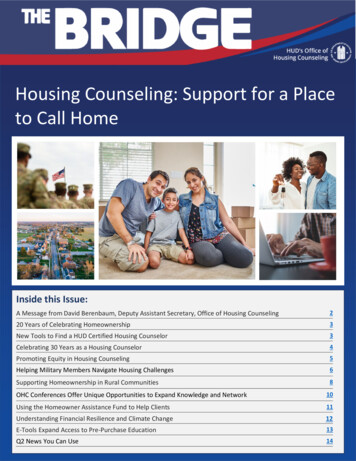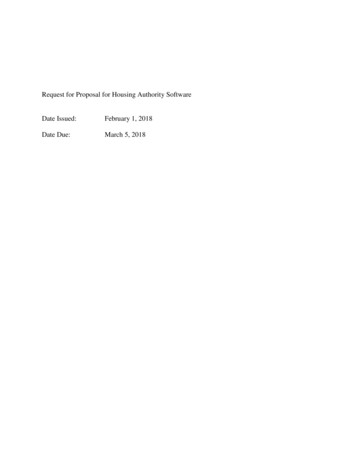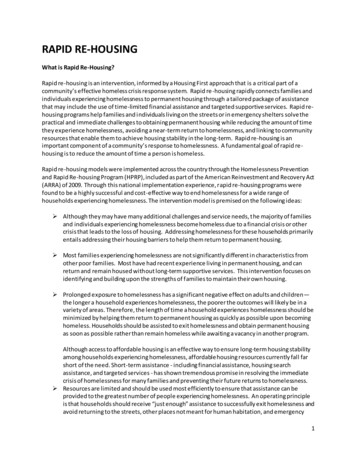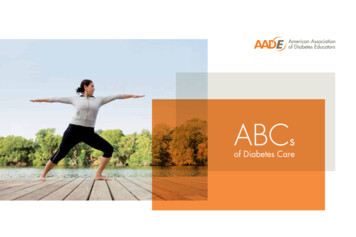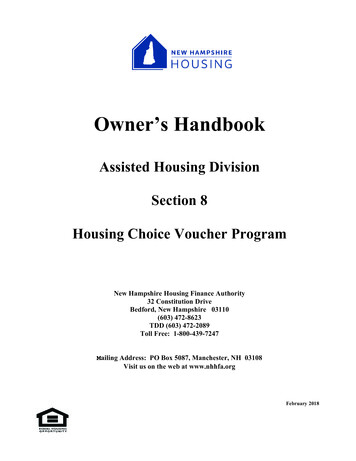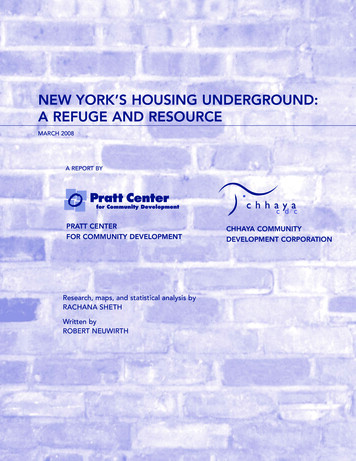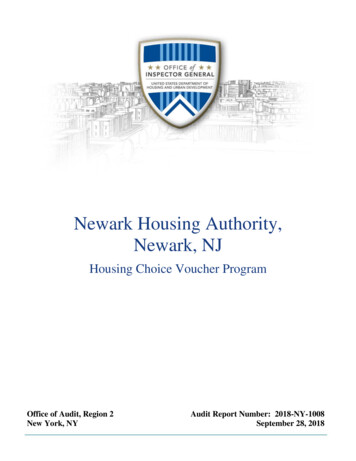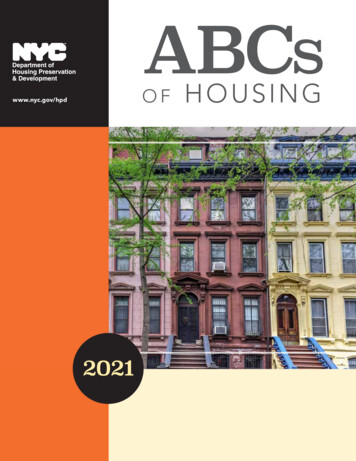
Transcription
ABCsHOUSINGofwww.nyc.gov/hpd2021
ABCsofHOUSING2021TABLE OF CONTENTSOwners’ and Tenants’ Rights and ResponsibilitiesStaying in Your Apartment Safely4–22I. CONDITIONSA. Heat and Hot WaterB. Carbon Monoxide and Smoke DetectorsC. LocksD. Lead-Based PaintE. MoldF. PestsG. Window GuardsH. Self-Closing DoorsI. Gas LeaksJ. Gas Powered Stoves: Stove Knob CoversK. ElevatorsL. Illegal Basement and Cellar Occupancy*NEW* M. COVID-194–11455678991010111111II. COMPLAINTS, VIOLATIONS AND ENFORCEMENTA. HPD Complaint ProcessB. ViolationsC. Emergency RepairsD. Housing CourtE. New York State Homes and Community Renewal (HCR)F. Alternative Enforcement Program (AEP)G. Proactive Preservation Initiative (PPI)12-1412131313–14141414III. HARASSMENT15–16IV. TENANT RESOURCESA. Initiating a Case in Housing Court16–1816B. Eviction Prevention17–18V. OTHER HOUSING ISSUESA. Rent-Regulated ApartmentsB. Tenant Data Privacy LawC. Certificate of Occupancy and Rent PaymentsD. Building SafetyE. Emergency Planning and Evacuations for Residential Building Owners/ManagersF. DiscriminationG. ForeclosureH. Tenant AssociationsI. Pets18–221819202020–2222222222VI. HOUSING EDUCATION23Resources for Affordable Housing Seekers23–24I. HOW TO APPLY FOR AFFORDABLE HOUSING23–24II. RENT INCREASE EXEMPTION24Resources for Owners25I. DIVISION OF NEIGHBORHOOD PRESERVATION (DNP)25II. LOW INTEREST LOANS AND TAX EXEMPTIONS25III. HOMEOWNER HELPDESK25IV. FILING BUYOUT AGREEMENT REQUIREMENTS25Useful Contact Information for Other Housing-Related Issues2326–27Housing Information Guide Signage Sample28Important Dates to Remember29This publication is intended for informational purposes only and is not intended as legal advice. This information is not a complete or finalABCs OF HOUSING statement of all of the duties of owners and tenants with regard to laws and rules relating to housing in New York City.
Owners’ and Tenants’ Rightsand ResponsibilitiesOwners and tenants have legal responsibilities to each other. The New York City Department of Housing Preservation andDevelopment (HPD) is one of many City and State agencies that enforce those responsibilities. This booklet is designed to helpowners and tenants gain an understanding of the rules and regulations affecting housing and provide you with informationabout where you can receive assistance.BUILDING OWNERSOwners must ensure thatcommon areas and individualapartments in their buildingsare safe and well maintainedin compliance with theHousing Maintenance Code(HMC) and Multiple DwellingLaw (MDL). Among otherresponsibilities, owners must: Provide and maintainsecurity measures, heat,hot and cold water, andgood lighting. Address leaks, mold, andpest issues immediatelyand conduct annualinspections for theseconditions. Provide smoke detectors,carbon monoxidedetectors, and ensureappropriate fire egress. Protect children bycomplying with regulationsregarding lead-basedpaint and window guards. Post a notice about theavailability of the ABCs ofHousing in the commonarea of their building (seeinside back cover for asample of the notice thatmust be posted). Post appropriate signageat the building, fileappropriate documentswith HPD, and provideappropriate notices totenants.TENANTS Only rent legal residentialTenants should expect tospace for living, as defined live in safe, well maintainedby a property’s Certificate buildings that are:of Occupancy. Free from pests, leaks,mold, and other potentially Maintain records abouthazardous conditions.compliance with leadbased paint regulations.Owners of residentialproperties with three ormore residential units, andfor 1–2 family homes ifneither the owner nor theowner’s immediate familyreside at the property, mustregister the units annuallywith HPD at: nyc.gov/propertyregistration.If the building is rentstabilized, the owner mustregister rents annually withNYS Homes and CommunityRenewal (HCR) at nyshcr.org. Property owners cannotlock tenants out ofapartments or otherwiseharass tenants to leave anapartment. Owners canbring eviction proceedingsif tenants do not meettheir responsibilities.Further details about all ofthe above topics are coveredin this document or by goingto www.nyc.gov/hpd. Provided with basicservices such as heat,hot water, cold water,and electricity. Free from harassment bythe owner and the owner’semployees.Tenants who are in rentstabilized units haveadditional rights related tothis status. Tenants can findout if an apartment and/orbuilding has been registeredas rent-stabilized by callingHCR at 718-739-6400 orsending an email torentinfo@nycshr.org.Tenants have responsibilitiesto their building owners andother tenants. They may not damage thebuilding, intentionally orthrough neglect. Tenants are responsible forthe actions of their guests. Tenants must respond toannual owner inquiriesrelated to window guardsand lead-based paint,and maintain smokeand carbon monoxidedetectors. Tenants must obey thelegal terms of leases, payrent on time, honor therights of other tenants, andprovide access for repairs.OWNER ENTRY TO AN APARTMENTThe law provides that a tenantmust permit the owner, or hisor her agent or employee, toenter the tenant’s apartmentor other space under his orher control to inspect, makerepairs, or make improvementsas required by the HMC orother law. The owner mustnotify the tenant in advance,in writing, of the day and timehe or she wishes to access theapartment. The appointmentmust be between 9am and5pm during the week, unlessotherwise agreed to by thetenant or unless there is anemergency that must beaddressed immediately. Whenrepairs are urgently needed toprevent damage to propertyor to prevent injury to persons,such as repairs of leaking gaspiping or appliances, leakingwater piping, stopped-upor defective drains orleaking roofs, or broken anddangerous ceiling conditions,no advance notice is requiredfrom the owner, agent,contractor, or workman.Any contractor or agent of theowner must be able to showthe tenant that he has beenauthorized by the owner toenter and do the work.ABCs OF HOUSING3
Staying in Your Apartment SafelyI. ConditionsTenants may have several options to pursue if physical conditions in a building are not safe orin good repair. Tenants in privately owned buildings with maintenance problems should firstnotify the building owner or manager. If verbal notification does not result in a resolution tothe problem, tenants may wish to send written notification through certified mail, with a returnreceipt requested. Keeping these records is important if the owner does not take any action toaddress the issue(s). In addition, tenants may file complaints with the city for most complaints bycalling 311, using 311ONLINE or 311Mobile and, in the case of rent-stabilized or rent-controlledapartments, with the state.For more details on any of the below conditions, please visit HPD’s website at nyc.gov/hpd.A. Heat and Hot WaterHeat is required betweenOctober 1st and May31st, a period designatedas “Heat Season.” Buildingowners are required toprovide tenants with heatduring these months underthe following conditions: When the outsidetemperature is below55 degrees Fahrenheitbetween the hours of6am and 10pm, buildingowners must heatapartments to at least 68degrees Fahrenheit. HPDcan only issue violations ifthe owner fails to supplyadequate heat when theoutside temperatureis below 55 degreesFahrenheit.Heat & Hot Water Between the hoursof 10pm and 6am,regardless of the outsidetemperature, buildingowners must heatapartments to at least62 degrees. Building owners alsomust ensure that tenantshave hot water 24 hoursa day, 365 days a year,at a minimum constanttemperature of 120degrees Fahrenheit.4ABCs OF HOUSING PD may seek penalties forHheat violations in HousingCourt. An owner may beeligible to satisfy a heat/hotwater civil penalty for a firstviolation by submitting a 250payment with a timely Noticeof Correction. Additionally,for a third or any subsequentinspection that results ina heat violation within thesame heat season (Octoberthrough May) or a hot waterviolation within a calendaryear, HPD will bill a fee of 200 for the inspection.In July 2020, HPDimplemented the Heat SensorProgram requiring selectedmultiple dwelling propertieswith heat violations andheat-related complaintsto install internet capabletemperature reportingdevices in each dwelling unit.HPD will conduct inspectionsduring the heat season,without receipt of complaint,for compliance with theheat sensor installationrequirements and therequirements for providingheat and hot water.
B. Carbon Monoxide and Smoke DetectorsCarbon monoxide (CO)is an odorless andhighly toxic gas. In general,landlords are required toprovide and install at leastone approved CO detectorin each dwelling unit andprovide written informationabout how to test andmaintain them. The detectormust have an audible endof-useful-life alarm. A COdetector must be installedwithin 15 feet of the primaryentrance to each sleepingroom.Landlords must also installsmoke detectors in eachapartment. Replace the batteries inTenants are responsible formaintaining both devices.If a tenant has removedthe detector or failed toreplace its battery, he/shemust return it to properworking order. Listen for an alarm soundFor safety’s sake, tenantsshould:detectors at least twicea year.when the battery is lowand replace the batteryimmediately. Use only the type ofbatteries recommendedon the detector. Never paint overdetectors. Test all detectors at leastonce a month.Tenants residing in the following building classes who fail to maintain, lose, or damage thedetector are required to:Class A Building(permanent occupancy)Reimburse the building owner 25 for each smokedetector and each CO detector, or 50 for each jointsmoke/CO detector. Occupant has one year from thedate of installation to make a payment.Class B Building (transient use)Not required to reimburse property owners foreither devicePrivate Dwelling(1–2 family homes)Reimburse the building owner 25 for each CO detector.Occupant has one year from date of installation to makea payment.CarbonMonoxide& SmokeDetectorsC. LocksDOUBLE CYLINDERLOCKS AND KEY-LOCKEDWINDOW GATESDouble cylinder locks ondoors and key lockedwindow gates that require akey from inside the apartmentto unlock or to access the fireescape are illegal and mustbe removed.In case of a fire or otheremergency, delay in findingor using the key can reducea tenant’s chances ofescape. Tenants can protectthemselves with legal windowgates, which lock by use of alatch system, by checking thelabel with the serial numberon it to make sure it statesthat it has been approved foruse in New York City.LocksABCs OF HOUSING5
D. Lead-Based PaintLLead-BasedPaintNew York City’sLeadFreeNYC plan wasreleased in January 2019and outlined 45 separateinitiatives that the Mayor’sOffice and a numberof City Agencies areundertaking to removelead from buildings. Tolearn more about theCity’s efforts to preventlead exposure, visit theLeadFreeNYC website at:nyc.gov/leadfreeHPD’s “Get Ahead ofLead” webinar series,accessible from HPD'sLead-Based Paintwebpage nyc.gov/leadbased-paint, can help youlearn more about all ofthe responsibilities andobligations under LocalLaw 1 of 2004 as outlinedhere.ead is a harmful metaloften found in old paintthat can be poisonous foryoung children if it createsdust or paint chips. Youngchildren can swallow the leadpaint dust and chips fromwindow sills and floors. Leadcauses behavior and learningproblems in young children.While NYC banned leadbased paint in 1960, olderbuildings may still containit. Property owners of thesebuildings are responsiblefor keeping tenants safefrom lead-based painthazards. Property ownersmust identify and remediatelead-based paint hazardsin the apartments and thecommon areas of thosebuildings where there areyoung children, using trainedand appropriately certifiedworkers and safe workpractices.Under Local Law 1, leadbased paint hazards arepresumed to exist if: The building was builtbefore 1960 (or between1960 and 1978 if the ownerknows that there is leadbased paint) and, The building has three ormore apartments or thebuilding has a rented unitin a one- or two-familyhome and, A child under the age ofsix lives in the apartmentor routinely spends 10or more hours per weekthere.Owners must ask tenantsin writing, using an annualnotice available on the HPDwebsite, whether childrenunder the age of six are6ABCs OF HOUSINGin residence. If so, ownersmust visually inspect theapartments and commonareas for lead-based painthazards at least once a year.Property owners can hirequalified companies toconduct testing to determinewhether there is lead-basedpaint in their buildings andwork proactively to reducethe liability associated withlead-based paint. Leadbased paint violations mustbe repaired by trained andappropriately certifiedworkers using safe workpractices, within the timeframes specified by lawand HPD rules. If ownerscan show that there is nolead paint in the building orperform abatement using theappropriate methods andcertified workers, and obtainan Exemption from HPD, thenthe annual requirement forobtaining information fromthe tenant and conductingvisual inspections do notapply.Owners should be awareof the following changesto Lead-Based PaintHazards law.1. Under Local Law 64 of2019, the definition of theterm “resides” now meansto routinely spend 10 ormore hours per week ina dwelling unit, whichincludes both a child wholives in the apartment anda child who just visits forthis period of time. Thisnew definition went intoeffect in January 2020.2. Clearance tests to confirmthat no lead dust remainsafter construction workis performed must beperformed every time workis done in a building thatLocal Law 1 covers. Thelead dust threshold levelsfor clearance of work areas,showing there is no leaddust, were lowered as ofJune 2019 to: Floor: 10 or more micro-grams per square foot Window Sills: 50 ormore micrograms persquare foot Window Wells: 100 or moremicrograms per squarefootThe thresholds will be loweredagain in June 2021 to: Floor: 5 or more micro-grams per square foot Window Sills: 40 or moremicrograms per squarefoot Window Wells: 100 or moremicrograms per square foot3. There are a significantnumber of record-keepingrequirements related tolead-based paint, andHPD will be auditingmore properties eachyear. There are significantcivil penalties that can beimposed for the failure tokeep these documents for10 years.4. In effect August 2020and with five years forfull compliance, LocalLaw 31 of 2020 sets anew requirement totest all rental units inbuildings built before1960 for the presenceof lead-based paintusing an independentEnvironmental ProtectionAgency (EPA) certified
inspector or risk assessor,by August 2025. If a childunder six comes to residein a unit, the testing mustbe done within 1 yearor by the August 9, 2025deadline, whicheveris sooner. The resultsmust be provided tothe tenants. If there isno lead- based paintin a unit OR an ownerproperly abates lead byremoving or enclosing itas outlined in the law, theowner should apply for anExemption from many ofthe requirements of LocalLaw by filing an Exemptionapplication with HPD.5. Property owners of pre1960 buildings are alsorequired to take action toremove and/or remediatelead-based paint oncertain surfaces wheneveran apartment turns overand before the new tenanttakes occupancy. In 2021,as implemented by LocalLaw 28 of 2020, HPD willexpand its enforcement ofthe turnover requirementsduring agency in-dwellinginvestigations for leadbased hazards.PROPERTY OWNERSRESOURCES For information on freetraining on lead-safehome repair, please callDepartment of Health andMental Hygiene (DOHMH)at 212-226-5323. See thesection in the ABCs onloans and grants availablefor owners, some of whichspecifically address leadbased paint. For sampleforms and informationvisit HPD’s nyc.gov/lead-based-paint. You do not need tohire a professional toconduct your annualvisual investigation.However, HPD highlyrecommends that whoeverconducts this investigationtake the online visualassessment trainingoffered by the federalDepartment of Housingand Urban Developmentat ssessment/h00101.htm.TENANTSTenants should report peelingpaint in an apartment tothe landlord. If the landlorddoes not fix peeling paint orif work is being done in anunsafe manner (for example,creating dust that is not beingcontained), tenants should call311. Tenants may also call 311to learn how to prevent leadpoisoning, find out where toget their children tested, findinformation about pregnancyand lead, or requestbrochures and materials onlead poisoning prevention. Tenants are required to: Fill out and return theAnnual Notice regardinglead-based paint that youreceive from the landlord. Notify the landlord inwriting if a child under sixcomes to live with you,routinely spends 10 ormore hours a week withyou, or if you have a baby.Tenants should: Wash floors, window sills,hands, toys, and pacifiersoften. Remind your doctor totest your children for leadpoisoning at ages oneand two.E. MoldMold may cause allergicreactions, irritation,or trigger asthma in somepeople. Mold needs wateror moisture to grow so it isimportant for building ownersto fix leaks promptly.Residents can help preventmold growth on bathroomor kitchen surfaces by usingexhaust fans or openingwindows and frequentlycleaning surfaces. Tenantsshould report leaks andsigns of mold growth to theirbuilding owners. If repairs arenot made, call 311.Cleanup of mold mayrequire licensed contractors;property owners and tenantscan read more about theserequirements on HPD’swebsite, nyc.gov/hpd orvisit the DOHMH websiteat nyc.gov/doh.UNDERLYING CONDITIONSThe Underlying ConditionsProgram allows HPD to issuean administrative order toresidential building owners tocorrect underlying conditionsthat have caused, or arecausing, leaks and moldconditions.HPD selects buildings forparticipation in the programeach year based on thenumber of apartmentsaffected by mold and leaks,and the number and severityof the violations. Propertyowners are required toinvestigate the cause of leakor mold conditions affectingmultiple apartments in abuilding, and to addressthe conditions and relatedviolations within four months.HPD may sue non-compliantowners in Housing Court. Thecivil penalty is 1,000 for eachdwelling unit with a minimumof 5,000.MoldABCs OF HOUSING7
F. PestsRoaches, mice, andrats can be hazards toindividuals with respiratoryconditions, such as asthma.The first step to eliminatingpests is by cutting off theirfood and water supply.Cockroaches and mice arebest controlled by sealing upholes and cracks, cleaningup droppings, and using safepesticides. Building ownersshould work with their pestcontrol contractor to identifypest infestations and ways tokeep pests out. Owners canpest-proof their buildings byfixing leaks and containinggarbage. Tenants can help bykeeping food and garbagecovered and reducing clutter.To learn more about pests,see DOHMH ControllingPests Safely atwww.nyc.gov/doh.BEDBUGSBedbugs are rusty-redcolored insects that can growto the size of apple seeds.Pests8ABCs OF HOUSINGBedbugs feed on humanblood, but do not carrydiseases. Infestations canspread among apartmentswhen bedbugs crawlthrough small crevices orcracks in walls and floors.Early detection of bedbugsis the key to preventing asevere infestation. For moreinformation on bedbugs,detection, and informationon how to treat bedbugs,take HPD’s free “BedbugManagement” course onlinein English or Spanish at nyc.gov/hpd or visit the DOHMHat www.nyc.gov/doh.New York State law requiresthat landlords hire onlypest control professionalslicensed by the NY StateDepartment of EnvironmentalConservation (DEC) to treatapartments for bedbugs.The pest control professionalshould perform an inspectionto confirm the presenceof bedbugs, locate andeliminate hiding places, treatthe apartment with cleaningsor pesticides and makefollow-up visits to ensure thatthe bedbugs are gone.When calling 311 to makea bedbug complaint, thecaller may be asked by the311 operator about whetherit would be acceptable forHPD to bring a dog trainedto sniff out bedbugs toparticipate in an inspection.If the dog is not allowed, anHPD Inspector will conduct avisual inspection. Violationswill be issued if the Inspectoris able to visually confirm thepresence of live bedbugs.Multiple bedbug violationsin a building may lead toenhanced enforcement.Property owners must reportinformation about bedbugoccurrences in their buildingselectronically with HPD eachyear at / during the monthof December.
G. Window GuardsEach year, youngchildren are injured ordie as a result of falls fromunguarded windows. Theseare preventable deaths andinjuries.The law requires ownersto send an annual noticeto tenants of multipledwellings (buildings ofthree or more apartments)regarding window guards.It also requires ownersto provide and properlyinstall approved windowguards on all windows in allapartments where a child10 years of age or youngerresides, including first floorbathrooms, windows leadingonto a balcony or terrace, andwindows in each commonarea on any floor.The exceptions to this laware windows that open ontoa fire escape, and windowson the first floor that are arequired secondary exit,since the fire escapes starton the second floor.If tenants or occupantswant window guards for anyreason, even if there are noresident children 10 years ofage or younger, the tenantcan request the windowguards in writing and thelandlord must install them.For example, occupants whohave visiting grandchildren,parents who share custody,and occupants who providechild care may wish torequest window guards.Tenants should call 311if required or requestedwindow guards have notbeen installed, if they appearto be insecure or improperlyinstalled, or if there is morethan four and a half inches ofopen unguarded space in thewindow opening.Tenants should not removeor unscrew window guardsfor any reason, including toinstall air conditioners. TheDepartment of Health andMental Hygiene’s website(nyc.gov/doh) can provideadditional information on: Annual notices Installation requirementsfor approved windowguardsWindowGuards VariancesH. Self-Closing DoorsSelf-closing doors inapartments and inpublic hallways are a criticalcomponent of fire safety.Self-closing doors shouldnever be blocked and canhelp contain a fire fromspreading throughout abuilding.In all multiple dwelling types,the following doors arerequired to be self-closing: Building entrance doors Other doors accessing thepublic hall/stairs (buildingcommercial space, garageareas, etc.) Unit entrance doors Fire stair doors Fire tower doors Bulkhead doors Rubbish chute closetdoorsSelf-ClosingDoorsABCs OF HOUSING9
I. Gas LeaksGas leaks can create firesand explosions. It’simportant that you and yourfamily know how to recognizea gas leak and what to do ifyou suspect a leak. Recognizea gas leak by:Smell—A distinctive, strongodor similar to rotten eggsGas LeaksSight—A white cloud, mist,fog, bubbles in standingwater, blowing dust, orvegetation that appears to bedead or dying for no reasonSound—Roaring, hissing, orwhistlingProperty owners are requiredto post signage and provideinformation to tenantsregarding what to do whenthey suspect a gas leak.2. After leaving the building,from a safe distance awayfrom the building, call 911immediately to report thesuspected gas leak;Anyone suspecting a gas leakshould:3. After calling 911, call thegas service provider forthis building.1. Quickly open nearbydoors and windows andthen leave the buildingimmediately; do notattempt to locate the leak.Do not turn on or off anyelectrical appliances, donot smoke or light matchesor lighters, and do not usea house-phone or cellphone within the building;Gas restoration should alwaysbe completed by a licensedplumber. For informationon the steps to restoration,property owners can visitwww.nyc.gov/hpd andsearch Gas.J. Gas Powered Stoves:Stove Knob CoversOStove Knob Covers10ABCs OF HOUSINGwners of a tenantoccupied multipledwelling must provide stoveknob covers for gas-poweredstoves where the ownerknows or reasonably shouldknow that a child undersix years of age resides.Households can forgo stoveknob covers through writtenrefusal to the landlord.Owners must also providestove knob covers in a unitwithout a child under six yearsof age if the tenant requeststhem. In addition, theowner is required to providetenants with an annual noticethat outlines the owner’sobligation as highlighted inthe law.
K. ElevatorsThe NYC Departmentof Buildings’ ElevatorDivision oversees the use andoperation of elevators in NYCbuildings by enforcing theNew York City Building Codeand other standards. Callor go online to 311 to file acomplaint if the elevator is notworking properly.Should an immediatelyhazardous elevator violationnot be remedied within thetimeframe allowed by DOB,HPD may seek to correctthe condition through itsEmergency Repair Programor through other enforcementmechanisms.ElevatorsIllegalBasement& CellarOccupancyL. Illegal Basement and Cellar OccupancyBasements and cellarsare very different spacesand have different legal uses.A basement is a story of abuilding partly below curblevel but with at least one-halfof its height above the curblevel. A cellar is an enclosedspace having more thanone-half of its height belowcurb level. Basements andcellars may not be occupiedunless the conditions meetthe minimum requirementsfor light, air, sanitation,and egress, and have beenapproved by the City’sDepartment of Buildings.Cellars in one and two-familyhomes can NEVER be lawfullyrented.Owners with illegallyconverted basements andcellars may face civil andcriminal penalties.Occupants of illegalbasement and cellarapartments face potentialdangers such as carbonmonoxide poisoning,inadequate light andventilation, and inadequateegress in the event of a fire.The City may require thatoccupants vacate or leaveany such apartment.Tenants who are vacated areoffered Emergency HousingServices through HPD.M. COVID-19Due to the unprecedented impact of COVID-19 on New York City, the City of NewYork and HPD have developed a list of resources for anyone seeking assistance.For housing resources and HPD service updates, please visit our COVID-19 Updates webpageat www.nyc.gov/hpd.COVID-19ABCs OF HOUSING11
II. Complaints, Violations and EnforcementProperty Registration is required annually for all residential buildings with 3 or more residentialunits and for 1–2 family homes if neither the owner nor the owner’s immediate family reside atthe property. Registration information is used to contact property owners about complaintsreceived by HPD and violations issued by HPD, as well as by other city agencies shouldemergencies occur at a property. For more details about how to register, property ownersshould go to www.nyc.gov/hpd and search Property Registration. Property owners arestrongly encouraged to provide email contact information to ensure the quickest and mostdirect communication from the agency.A. HPD Complaint ProcessTenants may file a complaint with HPD by calling 311, using TTY 212-504-4115, or by using 311online (nyc.gov/311) 24-hours-a-day, seven-days-per-week. Complaints regarding heat and hotwater may also be filed through the 311 mobile app.After a tenant files a complaint with 311 about a housing condition, 311 forwards the complaintto HPD. A notification call and/or email is made to the registered owner. The notificationis made to advise the owner of the problem only, and never closes the complaint. (Note toowners: if you are not properly registered, you may miss this important notification from HPD!)A call may also be made to the tenant to confirm whether the condition has been corrected. Ifthere is no confirmation of correction by the tenant, an inspector may be dispatched.In addition to responding to the complaint, HPD will alwaysinspect for nine safety issues:12ABCs OF HOUSING The presence of operational smoke detectors. The presence of operational carbon monoxide detectors. Illegal gates on the windows. Door locks that require a key to exit. Window guards if a child under age 11 resides in the unit. Self-closing dwelling unit entrance doors. Peeling paint if child under age six resides in the unit. Mold. Mice, cockroaches, and rats.
B. ViolationsIf HPD inspectors issue violations, the time the owner is given to correct them depends on theviolation severity. You can see all the open violations on a building on HPD’s website throughHPDONLINE. HPD will mail a Notice of Violation to the business address of the managingagent registered with HPD (or to owner directly if there is no managing agent). If the owner hassupplied an email with their Property Registration, HPD will also email information about theviolations to the owner. Heat and hot water violations are posted at the building at the time ofthe inspection. The Housing Maintenance Code has three classes of code violations: A, B, and C.Violation ClassTypeTime owner has to correct from noticebefore civil penalties begin to accrueClass ANon-Hazardous90 DaysClass BHazardous30 DaysClass C: Lead-Based Paint, Windows Guards,Mold, Mice/Cockroaches, and RatsImmediately Hazardous21 DaysClass C: Heat and Hot Water ViolationsImmediately HazardousImmediatelyClass C: (all others)Immediately Hazardous24 HoursOnce a violation condition has been corrected, it is the property owner’s responsibility tonotify HPD that the condition has been corrected through the certification process. Currentlyregistered Owners/Agents can certify violations as corrected through eCertification or bycompleting the violation documents mailed to the owner. To find out more about eCertification,the owner can go online to www.nyc.gov/hpd.Failure to correct violations may also result in civil penalties imposed by the Hou
6 ABCs OF HOUSING D. Lead-Based Paint Lead is a harmful metal often found in old paint that can be poisonous for young children if it creates dust or paint chips. Young children can swallow the lead
